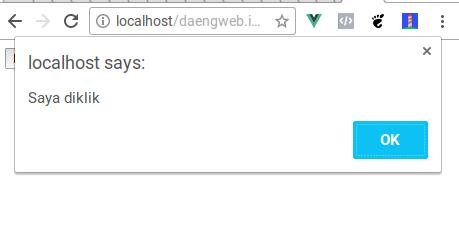

Because you are depending on the inputs v-model to update the keywords property, the value wont update. One possible solution is to use nextTick. vue.js keyup, keydown events one character behind. This will insert the invalid value and your RegEx pattern will not be executed. This event will not be fired when the user right clicks on the input element and clicks “Insert” (to insert a value from the clipboard).

After your keyUp event handler is called, Vue will see that the previous value of pace was “x” and is now an empty string and it will update the DOM (= change the value of the input element). Why does it work when using keyUp? This event handler is called at a later time when the DOM was already updated.

As the value has not changed, Vue does not update the value of the input element - the “x” that was inserted by the browser will not be updated. Why? Because it was empty and is now empty again (it was “x” for a short time but Vue did not reflect that change in the DOM). Vue will look at your pace variable and will see that nothing has changed. But now Vue will update the DOM, by checking what has changed. The checkPaceInput function is as follows: checkPaceInput: function() on the page, the div will still be empty. Filters should be appended to the end of the JavaScript expression, denoted by the pipe symbol: or define a filter globally before creating. Filters are usable in two places: mustache interpolations and v-bind expressions (the latter supported in 2.1.0+). I have the following input field defined: Vue.js allows you to define filters that can be used to apply common text formatting. This is a BootstrapVue application - not sure if that is relevant at all, but I thought it worth mentioning. In it, the poster asks about responding to any and all keypress events globally across the app.I am struggling to understand why a simple event handler to ensure that only certain characters can be entered is not working. So a bit more Googling, and I came across this Vue.js forum post: Capture keypress for all keys. You can test this yourself at my Codepen. Both the input handler and div handler will fire. But if you first click into one of the two input fields, things work as expected. If you type outside of any input field, nothing is registered. My handler just echoes out what was passed in: test(where, e) `) I listen, twice, at the div level, and then once for each input field. I'm passing a label to my test handler as well as the $event object. For my needs, I wanted keyboard handling at the "app" level, by that I mean without having to use an input field first. This modification will only fire when the enter key is pressed: Ĭool! But notice how the event is bound to an input field. So for example, this will fire an event on every keyup call: While not exactly what I was looking for, it reassured me that working with the keyboard was going to be easy. This section discusses how you can add shortcuts to listen for specific keys. If you look at the Vue docs for event handling, you'll find a specific section that talks about key modifiers.

In other words, keyup.ctrl will only trigger if you release a key while holding down ctrl.It won’t trigger if you release the ctrl key alone.exact Modifier. The good stuff below is all him, the bad stuff and mistakes are my fault.Īlright, so let's start with a simple example. Note that modifier keys are different from regular keys and when used with keyup events, they have to be pressed when the event is emitted. Before I share what I found, I want to give a shoutout to LinusBorg of the Vue forums. I knew that JavaScript had access to keyboard events, but I had never tried using them in Vue. My goal, and I won't make it 100%, is a game where you can use the keyboard for the entire time you play. For part of the game I wanted to really make use of the keyboard for interaction. This weekend I started working on another game in Vue.js (if you're curious, you can take a peak at it here if you want).


 0 kommentar(er)
0 kommentar(er)
